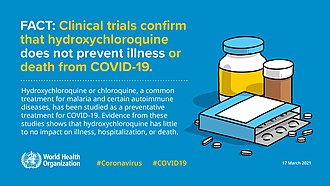Chloroquine and hydroxychloroquine during the COVID-19 pandemic
Chloroquine and Hydroxychloroquine during the COVID-19 Pandemic[edit]

Chloroquine and hydroxychloroquine are medications that were initially considered as potential treatments for COVID-19, the disease caused by the SARS-CoV-2 virus. These drugs are traditionally used to treat malaria and certain autoimmune conditions such as rheumatoid arthritis and lupus erythematosus. During the early stages of the COVID-19 pandemic, there was significant interest in their potential efficacy against the virus.
Background[edit]
Chloroquine and hydroxychloroquine are antimalarial drugs that have been used for decades. Hydroxychloroquine is a derivative of chloroquine and is generally considered to have a better safety profile. Both drugs have immunomodulatory effects, which led researchers to hypothesize that they might be effective against the inflammatory response seen in severe COVID-19 cases.
Initial Interest and Research[edit]
Early in the pandemic, some laboratory studies suggested that chloroquine and hydroxychloroquine might inhibit the replication of SARS-CoV-2 in vitro. This led to a surge in interest and the initiation of numerous clinical trials worldwide to evaluate their effectiveness in treating COVID-19.
Clinical Trials and Studies[edit]
Several clinical trials were conducted to assess the efficacy of chloroquine and hydroxychloroquine in treating COVID-19. These trials varied in design, including differences in dosage, patient populations, and endpoints. Initial small-scale studies showed mixed results, with some suggesting potential benefits and others showing no effect.
As larger, more rigorous trials were completed, the evidence increasingly indicated that these drugs were not effective in preventing or treating COVID-19. Notably, the World Health Organization (WHO) and other health agencies conducted large-scale trials, such as the Solidarity trial, which found no significant benefit of hydroxychloroquine in reducing mortality or the severity of COVID-19.
Safety Concerns[edit]
The use of chloroquine and hydroxychloroquine raised significant safety concerns, particularly regarding their potential to cause cardiac arrhythmias. These drugs can prolong the QT interval on an electrocardiogram, which can lead to potentially fatal heart rhythm disturbances. This risk was heightened when these drugs were used in combination with other medications that affect the heart.
Regulatory Actions[edit]
In response to the emerging evidence, several regulatory agencies, including the U.S. Food and Drug Administration (FDA), revoked emergency use authorizations for hydroxychloroquine and chloroquine for the treatment of COVID-19. The FDA and other agencies issued warnings about the potential side effects and advised against the use of these drugs outside of clinical trials.
Public Perception and Misinformation[edit]
The initial enthusiasm for chloroquine and hydroxychloroquine was fueled by media reports and endorsements by public figures, leading to widespread public interest and demand. This was compounded by misinformation and the politicization of the drugs, which led to shortages and impacted patients who relied on them for approved indications.
Conclusion[edit]
The case of chloroquine and hydroxychloroquine during the COVID-19 pandemic highlights the importance of rigorous scientific evaluation and the potential consequences of premature conclusions based on limited data. While these drugs are not effective for COVID-19, they remain important treatments for other conditions.
Related Pages[edit]
Ad. Transform your life with W8MD's Budget GLP-1 injections from $75


W8MD offers a medical weight loss program to lose weight in Philadelphia. Our physician-supervised medical weight loss provides:
- Weight loss injections in NYC (generic and brand names):
- Zepbound / Mounjaro, Wegovy / Ozempic, Saxenda
- Most insurances accepted or discounted self-pay rates. We will obtain insurance prior authorizations if needed.
- Generic GLP1 weight loss injections from $75 for the starting dose.
- Also offer prescription weight loss medications including Phentermine, Qsymia, Diethylpropion, Contrave etc.
NYC weight loss doctor appointmentsNYC weight loss doctor appointments
Start your NYC weight loss journey today at our NYC medical weight loss and Philadelphia medical weight loss clinics.
- Call 718-946-5500 to lose weight in NYC or for medical weight loss in Philadelphia 215-676-2334.
- Tags:NYC medical weight loss, Philadelphia lose weight Zepbound NYC, Budget GLP1 weight loss injections, Wegovy Philadelphia, Wegovy NYC, Philadelphia medical weight loss, Brookly weight loss and Wegovy NYC
|
WikiMD's Wellness Encyclopedia |
| Let Food Be Thy Medicine Medicine Thy Food - Hippocrates |
Medical Disclaimer: WikiMD is not a substitute for professional medical advice. The information on WikiMD is provided as an information resource only, may be incorrect, outdated or misleading, and is not to be used or relied on for any diagnostic or treatment purposes. Please consult your health care provider before making any healthcare decisions or for guidance about a specific medical condition. WikiMD expressly disclaims responsibility, and shall have no liability, for any damages, loss, injury, or liability whatsoever suffered as a result of your reliance on the information contained in this site. By visiting this site you agree to the foregoing terms and conditions, which may from time to time be changed or supplemented by WikiMD. If you do not agree to the foregoing terms and conditions, you should not enter or use this site. See full disclaimer.
Credits:Most images are courtesy of Wikimedia commons, and templates, categories Wikipedia, licensed under CC BY SA or similar.
Translate this page: - East Asian
中文,
日本,
한국어,
South Asian
हिन्दी,
தமிழ்,
తెలుగు,
Urdu,
ಕನ್ನಡ,
Southeast Asian
Indonesian,
Vietnamese,
Thai,
မြန်မာဘာသာ,
বাংলা
European
español,
Deutsch,
français,
Greek,
português do Brasil,
polski,
română,
русский,
Nederlands,
norsk,
svenska,
suomi,
Italian
Middle Eastern & African
عربى,
Turkish,
Persian,
Hebrew,
Afrikaans,
isiZulu,
Kiswahili,
Other
Bulgarian,
Hungarian,
Czech,
Swedish,
മലയാളം,
मराठी,
ਪੰਜਾਬੀ,
ગુજરાતી,
Portuguese,
Ukrainian